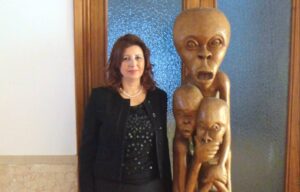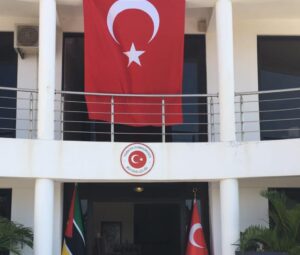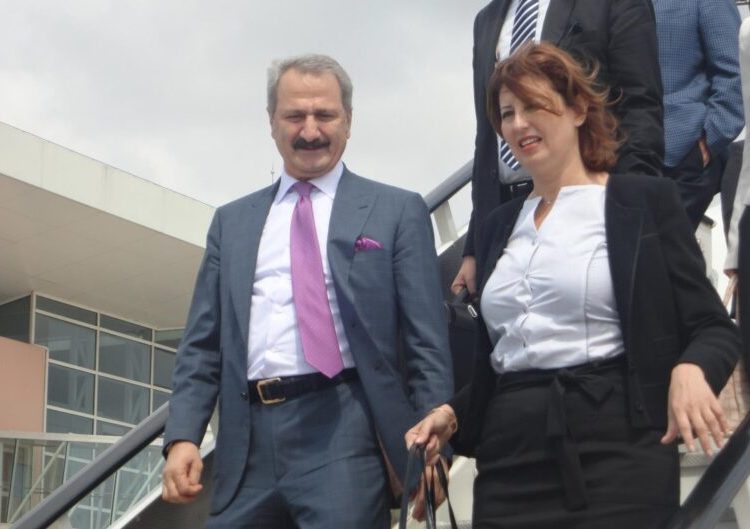Nordic Monitor
In a breach of the international conventions, Turkish diplomats in the southern African nation of Mozambique spied on critics of President Recep Tayyip Erdoğan, a secret Turkish Foreign Ministry document obtained by Nordic Monitor has revealed.
According to the communiqué, then-Turkish Ambassador to Mozambique Aylin Taşhan, the first ambassador of Turkey in the country, dispatched a cable to headquarters in Ankara that included information collected unlawfully by employees of the Turkish Embassy. The intelligence cable included the names and identities of critics of President Erdoğan as well as institutions and organizations set up by these people.
The people who were spied on are believed to be affiliated with the Gülen movement, a group that is critical of the Turkish government for a number of things, from rampant corruption in the administration to Erdogan’s aiding and abetting of armed jihadist groups in other countries.
The document, dated September 16, 2016, listed the names of 32 individuals as well Willow International School, Ltd., which runs one of the best performing schools in Mozambique. Several firms run by Turks such as DECO Construction Limitada, Turkmall Limitada, Isparta Construction Limitada, Ilhas da Paz and others were also profiled in the intelligence document.
Following a similar pattern seen in other diplomatic missions Turkey maintains in foreign countries, the Turkish Embassy in Maputo shared the list of persons living in the country so that their passports could be canceled by the Turkish Interior Ministry with no administrative or judicial investigation.
The cancellation of passports serves multiple purposes for Erdoğan in his quest to persecute his critics: It limits their free movement, especially to safer countries; prevents applications for extending permits or visas for legal stays; and paves the way for deportations and renditions.
Secret Turkish Foreign Ministry document that reveals extensive spying activities in Mozambique:
According to Article 23 of the Turkish Constitution, freedom of movement can be restricted by law for the purpose of investigation and prosecution of an offense and for the prevention of offenses. Moreover, a Turkish citizen’s freedom to leave the country may be restricted only by the decision of a judge based on a criminal investigation or prosecution. It demonstrates the arbitrary rule in Turkey, which is run by a one-man regime without respect for due process and in blatant violation of fundamental rights enshrined in the constitution.
The classified document reveals how widespread the spying network of Islamist President Erdoğan is and confirms the use of Turkish embassies for intelligence gathering and profiling of his critics and their organizations.
These documents containing information collected by the embassies are later used in criminal indictments of critics and their families on dubious charges of terrorism.
In December 2016 Ambassador Taşhan was assigned as general director of the foreign ministry’s intelligence section, the Directorate General for Research and Security Affairs (Araştırma ve Güvenlik İşleri Genel Müdürü). In her new capacity she continued to run large-scale spying activities using Turkish embassies and consulates around the world to gather intelligence. She was succeeded by Ambassador Zeynep Kızıltan. Earlier in December 2020, Taşhan was appointed ambassador to Slovenia.

A judicial document previously obtained by Nordic Monitor had confirmed her predecessors in Ljubljana had already engaged in a similar spying campaign. Turkish educators, academics and representatives of NGOs who had been listed by Turkish diplomats in Ljubljana were later indicted on dubious terrorism charges by a Turkish prosecutor. Those documents exposed clandestine spying activities in Slovenian territory that targeted critics as part of President Erdoğan’s long arm.
The document, pulled from a restricted case file, revealed the extent of spying activity by the Turkish Embassy that targeted critics and organizations in Slovenia. The people and organizations that were spied on by the embassy are believed to be affiliated with a civic group led by Fethullah Gülen, a US-based Muslim cleric who has become a vocal critic of Erdoğan for pervasive corruption in the government and the Turkish regime’s clandestine support for armed jihadist groups including the Islamic State in Iraq and Syria (ISIS) and al-Qaeda.
The Turkish president turned against the Gülen movement after major corruption investigations in December 2013 that incriminated Erdoğan, his family members and his business and political associates. A month later, in January 2014, an exposé of illegal arms shipments by Turkish intelligence to jihadists in Syria in 2014 created further troubles for the Erdoğan government for covertly fueling a civil war in the neighboring country.
The order to spy on Gülen-affiliated people and organizations came in early 2014, and volunteers of the movement were targeted with criminal prosecutions on fabricated charges of terrorism. In July 2016 Erdoğan staged a false flag coup to set up the opposition, including the movement, for mass persecution, pushed the army to invade northern Syria and declared himself the imperial president of the new Turkey.
As a part of Turkey’s global witch-hunt, Turkish diplomats systematically spied on critics of the president, collected information on Turks living abroad and transmitted it to headquarters while enjoying the privileges and immunities described in international conventions. In some countries, Erdoğan’s envoys coordinated the local elements of intelligence operations carried out by the Turkish intelligence agency (MİT) on foreign soil to abduct Turkish nationals.
Moreover, Nordic Monitor revealed how MİT infiltrated refugee camps in Greece in order to spy on opponents who were forced to flee to Greece to escape an unprecedented crackdown in neighboring Turkey.
It is clear that Turkish diplomatic missions violate the domestic laws of receiving states and the principles of international law by conducting unlawful information-gathering campaigns and sweeping intelligence operations.

The immunities and privileges of diplomats and consular staff are governed by international conventions. However, diplomats enjoying the privileges and immunities described in the Vienna Convention on Diplomatic Relations are under a duty to respect the laws and regulations of the receiving state and to avoid interfering in its internal affairs as detailed in Article 41. Similarly, the consular staff is granted limited privileges and immunities by the Vienna Convention on Consular Affairs, but the host state authorities can start investigations and prosecute any of the personnel if they perpetrate crimes inside or outside the consulate premises, according to Article 43 of the convention.
Turkish diplomatic missions continue systematic spying on Turkish government critics on foreign soil as confirmed by Foreign Minister Mevlüt Çavuşoğlu in February 2020. Çavuşoğlu said Turkish diplomats assigned to embassies and consulates have officially been instructed by the government to conduct such activities abroad. “If you look at the definition of a diplomat, it is clear. … Intelligence gathering is the duty of diplomats,” Çavuşoğlu told Turkish journalists on February 16, 2020, following the Munich Security Conference, adding, “Intelligence gathering and information collection are a fact.”
In his interview with The Globe and Mail, Turkish Ambassador to Canada Kerim Uras also admitted to spying on 15 Turkish-Canadians. “Any embassy would focus on the threats targeting their countries. That’s what every Embassy does,” he told The Globe and Mail.
Turkish Ambassador to Uganda Kerem Alp spoke to the state-run Anadolu news agency in March and confirmed that Turkish diplomats collect information on the business activities of Erdoğan critics living abroad and profile their companies as if they were part of a terrorist organization. Alp also revealed how the embassy was gathering information on the medical staff, educators and humanitarian volunteers working for Ugandan institutions. “There were some FETO followers who had sought to hide in Uganda and were working in schools or hospitals. … They have been disguising themselves as humanitarian workers,” he told the news agency. FETO is a derogatory term coined by the Turkish government to refer to the movement.
The crackdown on Erdoğan critics throughout the country intensified in the aftermath of the corruption scandal of December 2013 that incriminated Erdoğan, his family members and his business and political associates. Immediately after the corruption investigation, Erdoğan accused the police officers, judges and prosecutors involved in the case of mounting a coup against his government and claimed they were linked to the Gülen movement, which he branded a “parallel state.”












